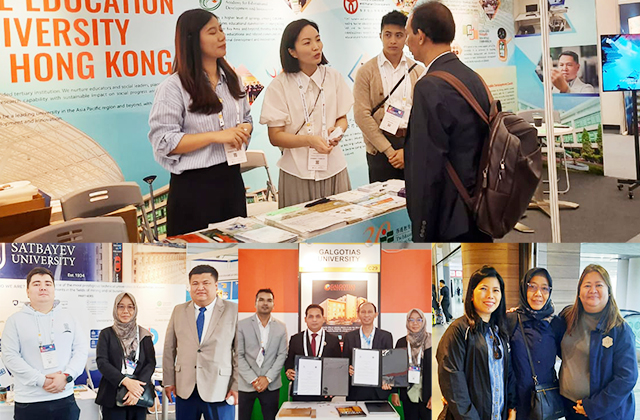Unram Strengthens Global Network and Internationalisation Strategy through QS HES 2024 in Macau

Mataram, University of Mataram – The University of Mataram (Unram) once again demonstrated its commitment to strengthening its global ranking and network by participating in the QS Higher Education Summit: Asia Pacific 2024 which took place at Macau University of Science and Technology (MUST) on 5-7 November 2024. The Unram delegation consisting of Prof. Dr. dr. Hamsu Kadriyan, Sp.THT-KL (K)., M.Kes. and Baiq Rien Handayani, SP., M.Si., Ph.D. attended this prestigious forum to explore world ranking strategies, expand cooperation, and gain new insights into the development of higher education in the Asia Pacific region.
Achievements and Strategic Insights from QS HES 2024
During this event, the Unram delegation received the “QS HES APAC 2024 – Insights Pack” document which contains information related to the development of higher education in the Asia Pacific region. This document provides valuable guidance and information for higher education institutions in Asia Pacific that want to actively participate in international research, increase attractiveness for international students, and utilise digital platforms as part of a global strategy.
The first piece of information is about the International Research Network (IRN). IRN is an important indicator used to assess a country’s international research collaboration in academic publications and research. IRN scores in the Asia Pacific region shows that Australia has the highest level of collaboration with a score of 96.6, followed by Malaysia (85.34) and China (82.14). Countries such as Japan, India and Pakistan also have relatively high scores, demonstrating their commitment to global research collaboration. On the other hand, Indonesia is at the bottom with a score of 33.86, indicating the potential for improvement in international research collaboration efforts.
The second is the trend of using MOOC (Massive Open Online Courses), one of the main media platforms for broad and open educational dissemination. Universities in the Asia Pacific region are increasingly utilising MOOC to reach out to international students. This platform also provides a great opportunity for educational institutions to build academic reputation globally.
Third, International Student Mobility, where the recovery of international student numbers, especially in Japan, is a valuable lesson for universities that want to attract more international students. The post-pandemic recovery of international student numbers in Japan shows a positive trend in the global mobility of students in the East Asian region. Japan, which continues to attract students from a wide range of countries, has managed to increase its international student numbers again as travel restrictions have eased. This data is relevant for Asia Pacific universities looking to increase their attractiveness to international students, by understanding international student mobility trends and post-pandemic recovery strategies.
The fourth piece of information is related to challenges and opportunities in the higher education sector. One of the main challenges faced by universities in the Asia Pacific region is increasing international visibility and reputation. For countries with low IRN scores, such as Indonesia, there is a need to strengthen international research networks to improve competitiveness at the global level. In addition, strengthening online and flexible education offerings through platforms such as MOOC can be an effective strategy to reach students beyond national borders.
New Cooperation and Partnership Initiation
On 6 November 2024, Unram delegates, Prof. Hamsu and Mrs Rien signed a Memorandum of Understanding (MoU) with Galgotias University, India. The agreement includes student and faculty exchange programmes, joint research, seminars, and academic projects. The signing was done by Prof. Hamsu as the representative of Unram Rector and Dr. Avadesh Kumar as the Pro Vice-Chancellor of Galgotias University.
In addition, the Unram delegation also explored cooperation with several international universities such as Bicol University, Philippines with a student exchange plan in July-August 2025. Then, with The Education University of Hong Kong which has opportunities for cooperation in the field of education, especially for the Faculty of Teacher Training and Education Unram.
Furthermore, Applied Science Private University (ASU), Jordan which will collaborate in the field of engineering with the Faculty of Engineering Unram. And with Saveetha Institute of Medical and Technical Sciences, India which offers student and lecturer exchange for academic and clinical activities.
Unram’s Commitment to the Future of Higher Education
In addition to establishing partnerships, QS HES 2024 also emphasises the importance of universities’ role in utilising technology such as Artificial Intelligence (AI) as a learning tool. Universities are expected to integrate AI into the curriculum while maintaining learning that humanises students.
Participation in QS HES 2024 is a strategic step for Unram to strengthen competitiveness at the international level, expand global networks, and prepare students to face the challenges of an increasingly dynamic world of work.
